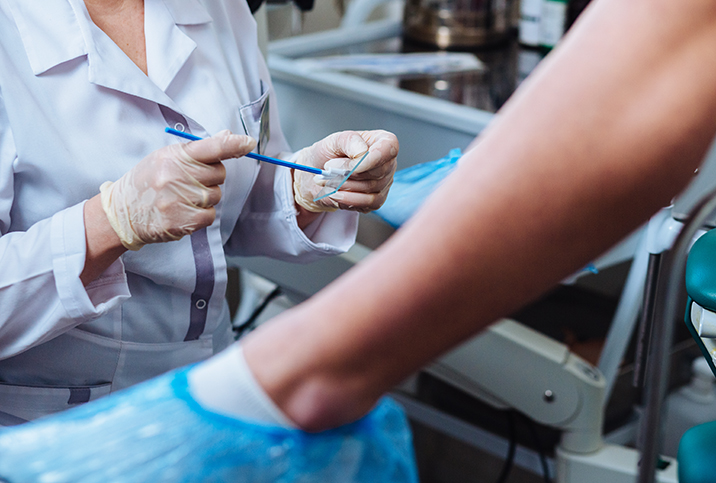Life After Cervical Cancer

Completing treatment for cervical cancer and finding out that you're free of the disease may make you breathe a huge sigh of relief. But the journey to readjusting to your daily life post-cancer can also bring challenges, both emotional and physical.
In some cases, treatment may fully remove or kill all of the cervical cancer cells. But for some women, treatment may only slow the growth of the cancer, which may never disappear.
Cervical cancer occurs when cells in the cervix—located at the bottom of the uterus and connecting the uterus to the vagina—mutate and grow out of control, causing harm to healthy cells. This year, an estimated 14,480 women in the United States will be diagnosed with cervical cancer, and 4,290 women will likely die of the disease, according to the American Cancer Society.
Treatment for cervical cancer in its early stages typically involves surgery either to remove some tissue from the cervix while leaving the organ itself intact, or to fully remove the cervix and the surrounding tissue, and sometimes the uterus, as well. Which procedure a patient undergoes depends largely on what stage their cancer is in, their overall health and whether they want to keep open the possibility of becoming pregnant in the future.
In addition, treatment often includes some combination of chemotherapy, radiation therapy and immunotherapy. Treatment for cervical cancer can take a lasting toll on the body, and it can take some time to fully recover.
Following up with your doctor
One of the biggest sources of anxiety following successful cancer treatment for many patients is the fear the disease will come back. If this sounds like a familiar feeling to you, you're not alone.
Women who have had their cervix and the surrounding lymph nodes removed as part of treatment have a very low chance of recurrence, according to medical experts. That being said, maintaining consistent follow-up care after cervical cancer treatment is important for your long-term health.
Your doctor will monitor you closely after cancer treatment through exams, lab tests and imaging tests, depending on the case. If you start to experience any new symptoms, let your doctor know, because it might be a sign of recurrence or of a new condition. These appointments are also a great time to address any lasting side effects you may be experiencing from treatment.
According to the American Cancer Society, women who show no signs of remaining cervical cancer will likely be scheduled for follow-up appointments every three to six months for the first couple of years after treatment, although patients who were treated for early-stage cervical cancer may not need such frequent follow-up appointments. Be sure to talk with your doctor to determine what follow-up care schedule is right for you.
If you had your cervix removed during treatment, you may be wondering if you even still need to get a yearly pap smear. Medical experts say you do.
Mayo Clinic guidance says that whether you were treated with radiation or surgery, your doctor may recommend you still get the screening test regularly. Pap smear tests typically involve extracting cells from the cervix for testing. Women who have had their cervix removed will get the cells in the upper part of their vagina tested instead. Continuing this screening test will help lead to early detection of any abnormal change in the cells of your vaginal tissue.
The emotional effects of surviving cancer
While surviving cervical cancer is obviously a reason to rejoice, it's also common (and normal) for patients to deal with mental health problems such as depression and anxiety during remission.
Some of these issues may stem from a fear that the cancer might come back. But there are many other reasons why it's difficult to bounce back emotionally after cancer treatment. Some patients may struggle with the mental fog or the physical fatigue caused by cancer treatment, leaving them feeling depressed because they are not able to immediately return to the activities they participated in before their diagnosis.
Some women also wrestle with the fact that their body doesn't look or feel like it once did. The physical changes caused by cervical cancer treatment can be particularly extreme for women who received surgical treatment. While some patients are able to get surgery that leaves their cervix intact, other women may require a full hysterectomy, eliminating the future possibility of becoming pregnant.
There's no quick fix to feeling like yourself again and coping with the changes you have experienced following cancer treatment. During this time, it will be important to lean on your friends and family for emotional support until you're feeling stronger. Don’t hesitate to also reach out for professional help.
Of course, sometimes the best support comes from people who can relate to what you're going through. If you think that's what you're in need of, consider joining a support group of fellow cancer survivors. However you choose to cope, remember that you don't have to go through it alone.
Resuming your sex life after cervical cancer
Getting back in the sack following cervical cancer treatment may feel daunting, but don't worry: In time, you should be able to resume your normal sex life.
Medical experts suggest you should be able to become sexually active again a few weeks after radiation therapy or surgery. It's important to note, however, that physical recovery following treatment can vary from person to person, so give yourself time to heal and don't pressure yourself to rush into anything.
Premenopausal women who received external radiation therapy or had their ovaries removed during surgery as part of their cervical cancer treatment will experience early menopause, which can lead to vaginal dryness and low libido and potentially affect their sex life. If you find yourself struggling with any of these issues, consider incorporating a lubricant into your sex life for greater comfort and talk to your doctor about other potential solutions that might help, such as hormone replacement therapy.
Radiation therapy may lead to vaginal tightness, while surgical treatment may leave you with a shortened vagina. Both cases could potentially lead to painful intercourse. While hormone therapy may be able to help restore your libido and a lubricant can solve issues of vaginal dryness, you may find that you simply have to adjust your sexual activity to accommodate the physical changes that your cervix and vaginal area have undergone.
Ultimately, when it comes to having sex after cervical cancer, the key element is communication—and lots of it. Over time and through experimentation, you and your partner can find mutually enjoyable ways to have sex and be intimate with each other once more.
Don't be discouraged if you're not back to having the best sex of your life right away. As you get further into your recovery journey, you will likely be back to having a fulfilling sex life again in no time.


















